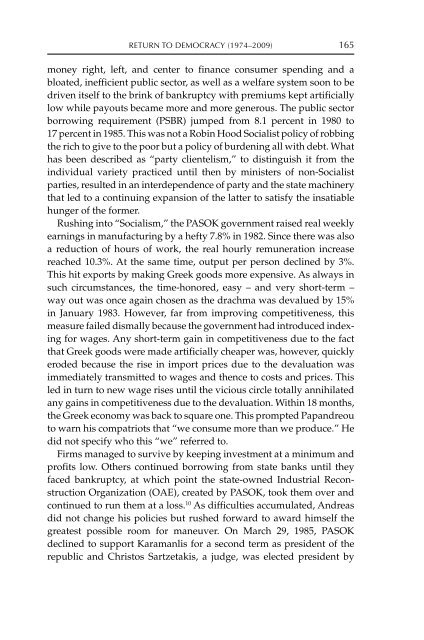MODERN GREECE: A History since 1821 - Amazon Web Services
MODERN GREECE: A History since 1821 - Amazon Web Services
MODERN GREECE: A History since 1821 - Amazon Web Services
Create successful ePaper yourself
Turn your PDF publications into a flip-book with our unique Google optimized e-Paper software.
RETURN TO DEMOCRACY (1974–2009) 165<br />
money right, left, and center to finance consumer spending and a<br />
bloated, inefficient public sector, as well as a welfare system soon to be<br />
driven itself to the brink of bankruptcy with premiums kept artificially<br />
low while payouts became more and more generous. The public sector<br />
borrowing requirement (PSBR) jumped from 8.1 percent in 1980 to<br />
17 percent in 1985. This was not a Robin Hood Socialist policy of robbing<br />
the rich to give to the poor but a policy of burdening all with debt. What<br />
has been described as “party clientelism,” to distinguish it from the<br />
individual variety practiced until then by ministers of non-Socialist<br />
parties, resulted in an interdependence of party and the state machinery<br />
that led to a continuing expansion of the latter to satisfy the insatiable<br />
hunger of the former.<br />
Rushing into “Socialism,” the PASOK government raised real weekly<br />
earnings in manufacturing by a hefty 7.8% in 1982. Since there was also<br />
a reduction of hours of work, the real hourly remuneration increase<br />
reached 10.3%. At the same time, output per person declined by 3%.<br />
This hit exports by making Greek goods more expensive. As always in<br />
such circumstances, the time-honored, easy – and very short-term –<br />
way out was once again chosen as the drachma was devalued by 15%<br />
in January 1983. However, far from improving competitiveness, this<br />
measure failed dismally because the government had introduced indexing<br />
for wages. Any short-term gain in competitiveness due to the fact<br />
that Greek goods were made artificially cheaper was, however, quickly<br />
eroded because the rise in import prices due to the devaluation was<br />
immediately transmitted to wages and thence to costs and prices. This<br />
led in turn to new wage rises until the vicious circle totally annihilated<br />
any gains in competitiveness due to the devaluation. Within 18 months,<br />
the Greek economy was back to square one. This prompted Papandreou<br />
to warn his compatriots that “we consume more than we produce.” He<br />
did not specify who this “we” referred to.<br />
Firms managed to survive by keeping investment at a minimum and<br />
profits low. Others continued borrowing from state banks until they<br />
faced bankruptcy, at which point the state-owned Industrial Reconstruction<br />
Organization (OAE), created by PASOK, took them over and<br />
continued to run them at a loss. 10 As difficulties accumulated, Andreas<br />
did not change his policies but rushed forward to award himself the<br />
greatest possible room for maneuver. On March 29, 1985, PASOK<br />
declined to support Karamanlis for a second term as president of the<br />
republic and Christos Sartzetakis, a judge, was elected president by


